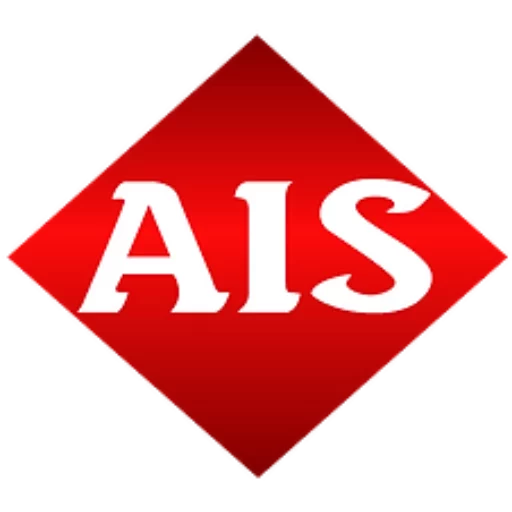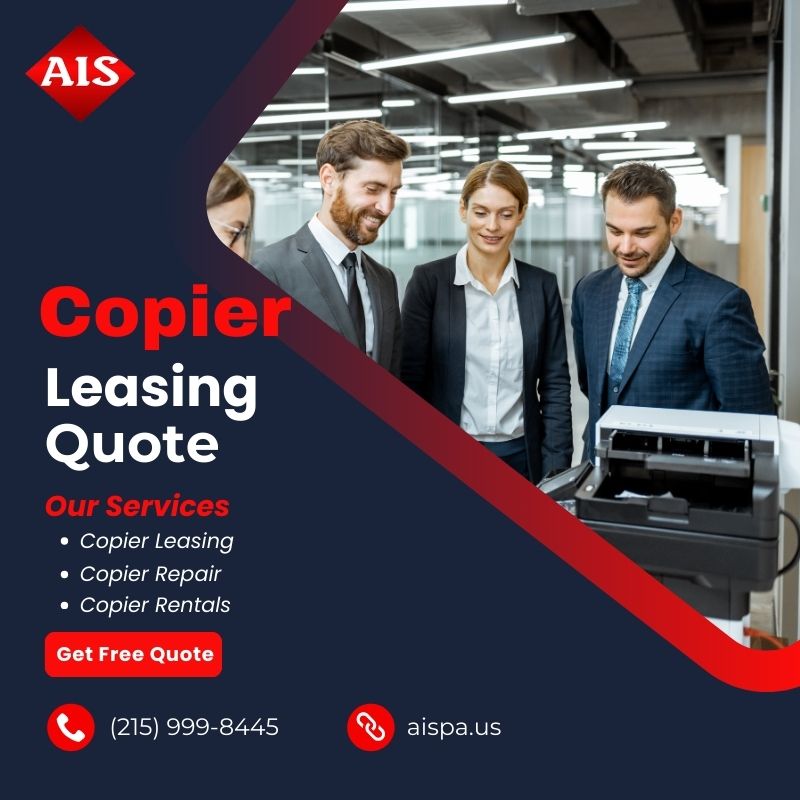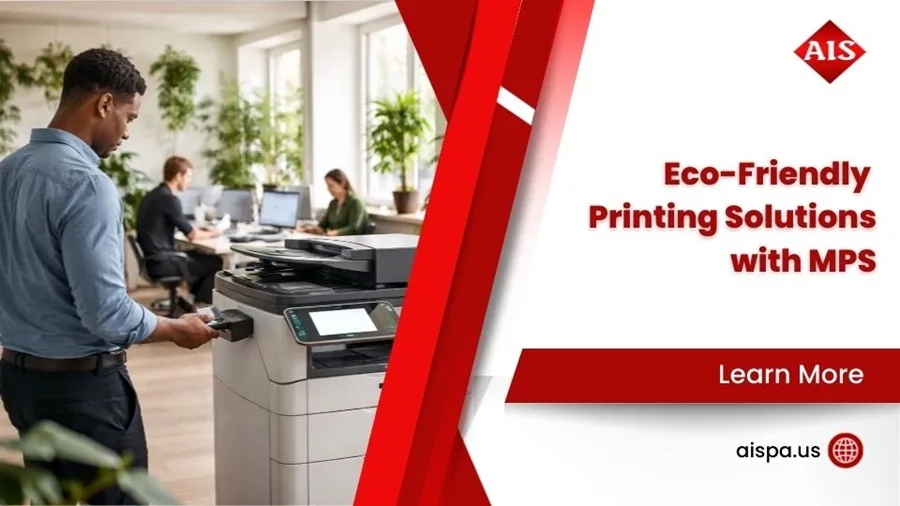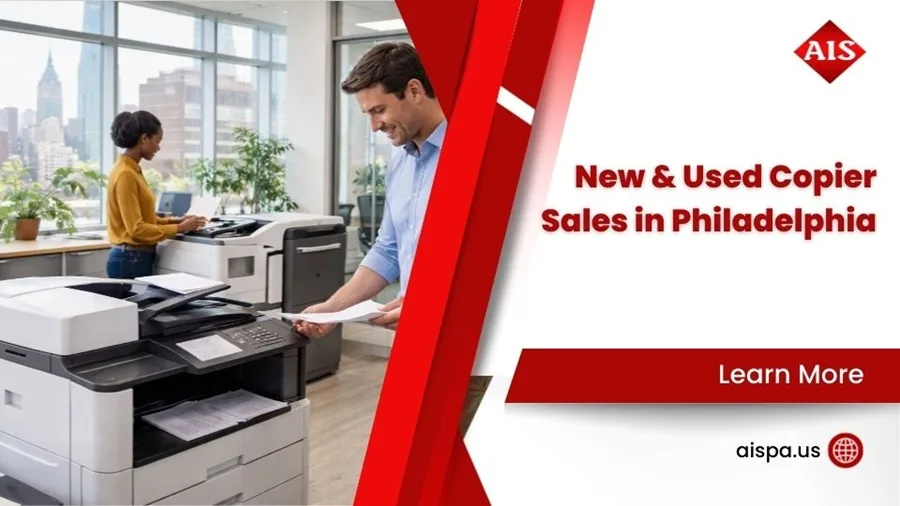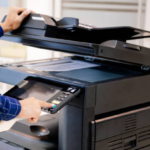Understanding Your Copier Lease Agreement: What You Need to Know
For businesses looking to purchase office equipment such as copiers, signing a copier lease agreement is often the most attractive option. It is important to understand the various terms and conditions of the agreement, as well as the end-of-lease options that are available. Knowing what to expect from a copier lease agreement can help businesses make an informed decision about whether to purchase, lease or look for other alternatives.
A copier lease agreement can be complex, but understanding the basics is essential. This includes the type of lease, the length of the lease, the upfront and monthly payments, and the buyout or fair market value (FMV) at the end of the lease. Different lease companies offer different terms and conditions, so businesses should look through their lease agreement carefully to ensure they are getting the best deal.
Overview of a Copier Lease Agreement
When it comes to office equipment, there are a variety of leasing options available, from short-term leases to longer leases ranging up to 60 months. A copier lease agreement is a legally binding document that outlines the terms and conditions of renting a copy machine over a period of time.
Often, a longer lease will have lower monthly payments than a shorter lease. A capital lease or buyout lease allows a business to own the copier at the end of the lease.
A basic copier lease agreement should include the cost of the copier, shipping fees, maintenance agreement, and other additional fees.

Types of Copier Leasing Agreements
Transitioning to the next step, it’s time to explore the different types of copier leasing agreements available to businesses. There are three primary types of agreements: an operating lease, a capital lease, and a buyout lease. An operating lease is the most common type of copier leasing agreement, as it allows businesses to pay a monthly fee for the duration of the lease term and then return the copier to the copier leasing company at the end of the lease.
A capital lease, on the other hand, allows businesses to own the copier outright at the end of the lease agreement if they make the agreed-upon lease payments plus interest. Lastly, a buyout lease gives businesses the option to purchase the copier at the end of the lease term for a predetermined price.
Key Components of a Copier Lease Agreement
Moving beyond the basics of what a copier lease agreement is and why it can be an attractive option for companies, it’s important to understand the key components of a copier lease agreement. A copier lease contract is a legally binding document that sets forth the terms and conditions of the copier lease.
The contract will include the cost of the new copier, shipping fees, additional equipment, and service contracts. It should also include the monthly lease payments, length of the lease term, and the end-of-lease options. Other key components of the agreement may include additional fees, a surcharge for early termination of the lease, the buyout clause at the end of the lease, and/or an automatic renewal clause.
How to Negotiate a Better Rate
It is important to know about copier lease negotiation when you are considering leasing a copier. Negotiating a better rate for your copier lease agreement can save your business a lot of money over the long-term. It’s also important to be aware of your lease document’s terms and conditions, as there are many areas in which you may be able to negotiate a better deal.
Before you lease a copier, be sure to look through your lease agreement and understand the terms. Research current copier lease contracts and compare them to yours to ensure you are not getting a bad deal. Make sure to discuss your lease agreement with the copier dealer and let them know you are knowledgeable about copier leasing. Ask if there are any discounts or special offers they can provide.
Understanding Your Rights and Responsibilities
When it comes to understanding your rights and responsibilities, it’s important to look at the components of a copier lease agreement, including what’s included, terms and conditions, and penalties for non-compliance. Buyers and leasers must consider the current lease, toner, and maintenance contract before purchasing a copier.
It’s also important to consider the choice for companies between buying or leasing. Agreement terms should include the end of your lease, separate from your lease, and any return of the machine. Penalties for non-compliance could include additional fees, surcharges, and early termination of the lease.
What Is Included in the Agreement
Now that we have an understanding of the overview of a Copier Lease Agreement, let’s dive deeper into what is included in the agreement. A copier lease agreement includes details of the Xerox machine, such as the cost of the copier, shipping fees, additional equipment, and other components. It also includes the length of the lease, terms and conditions, penalty fees, and the end-of-lease options.
Furthermore, it includes details about the lease payment, whether you’re leasing an office copier, a high-volume printer, or a managed print solution. The agreement outlines whether you want to purchase the copier at the end of the lease or whether you need to decide whether you’re buying one or leasing copiers.
Terms and Conditions
Having discussed the overview of a copier lease agreement, it is now time to consider the terms and conditions. A copier lease agreement is a legally binding document that outlines the responsibilities of the lessee and the leasing company, and it is important to understand the conditions of the contract before you sign it. In most cases, the agreement will include the cost of the copier, delivery and installation, a maintenance contract, and a service contract.
It may also include additional equipment, shipping fees, and additional fees for any other services that you may require. The lease agreement should also include the terms and conditions of the agreement itself, such as duration of the lease, early termination, buyout options, and penalties for non-compliance.
Penalties for Non-Compliance
It is important to understand what the penalties for non-compliance are in a copier lease agreement. Whether you’re looking to lease a copier for a short-term project or need a long-term solution to keep up with high volume printing, understanding the penalties for non-compliance will help ensure you’re able to avoid any additional costs.
If you decide to end the lease agreement early, the lease company may charge an early cancellation fee. Additionally, if you choose not to renew the agreement or buy the copier at the end of the lease, you may be subject to a lease buyout fee. If the copier is returned in a condition that is not in accordance with the agreed upon terms, you may be responsible for any necessary copier parts or repairs.
Assessing the Value of the Agreement
When assessing the value of the agreement, it is important to consider the cost of equipment, maintenance, and supplies. Purchasing a copier outright can be expensive and may not be the most cost-effective option. Leasing early has its advantages, such as having access to the latest technology and avoiding the cost of buying out the machine at the end of the lease.
Leasing vs. purchasing should also be considered, as a copier lease agreement might be an attractive option for high-volume users. The cost of maintenance and supplies should also be included in the contract terms, as they can add up quickly and could cost more than the monthly lease payments.
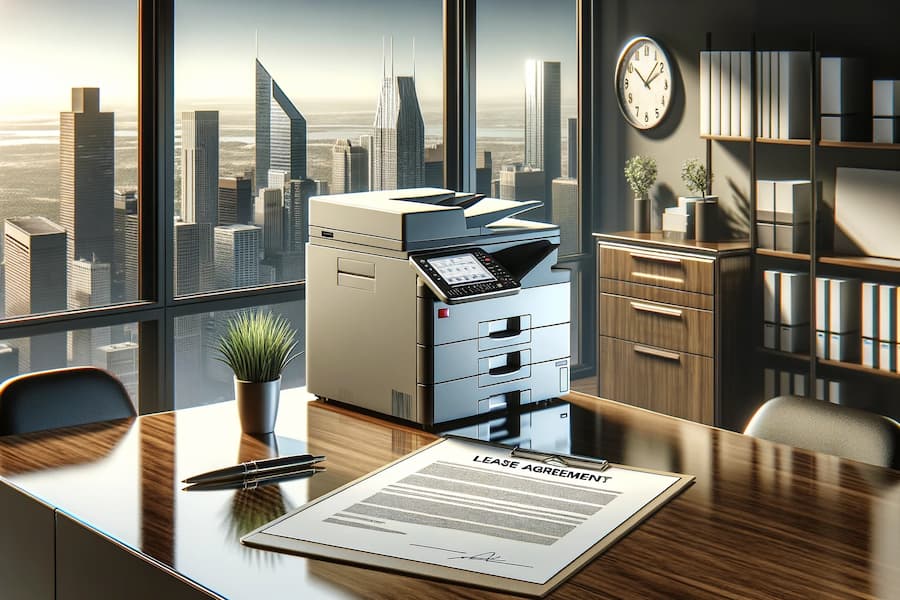
Cost of Equipment
As businesses assess the value of the agreement, the cost of equipment is an important factor to consider. When deciding whether to buy a copier or lease one, a few considerations can help you make the best decision. Leasing early may be the ideal choice for companies who anticipate their copier needs changing over the course of the lease term.
A copier lease works well for businesses that need the latest technology available or a high-volume copier. If you’re unsure of how long you’ll need the copier, leasing automatically allows you to renew or return the machine at the end of the term. Rather than buying a copier outright, leasing may be the better option.
Cost of Maintenance
As you consider the value of the agreement, it’s important to factor in the cost of maintenance. A copier lease might include a maintenance agreement, which could include parts and labor for repairs as well as toner, ink, and other supplies. Whether you’re in the market for a new copier or simply seeking a 1 buyout, it’s important to understand the cost of maintenance.
Those who choose a lease instead of buying a copier can often avoid expensive repairs and parts costs. Business insurance could also be included in the cost of the lease, providing additional protection. Feel free to reach out if you have any questions or need help weighing the costs of a copier lease against the cost of buying one.
Cost of Supplies
Making an informed decision about a copier lease agreement requires assessing the value of the agreement and understanding the cost of supplies. With the right lease agreement, companies can gain access to the latest technology and supplies with minimal upfront cost. Lease early and lease automatically to ensure the supplies are always up-to-date and paperless. Supplies are an important factor to consider when assessing the value of the lease agreement.
The cost of supplies vary depending on the current market and the lease agreement terms. It’s important to look through the lease agreement carefully to determine if the cost of supplies is included in the monthly payment or if it’s a separate fee.
Choosing a Reputable Leasing Company
When selecting a reputable leasing company, it is important to research the company, read reviews and testimonials, and ask for references. Start by researching the company online to learn about their services and leasing terms. Read reviews from other customers to get an idea of their experience with the company. In addition, look for testimonials from past customers to see how they rate the company’s services.
Finally, ask for references from the company to get an even better idea of their reputation. Make sure to do your due diligence in researching the company before signing any lease agreements.
Research the Company
Having thoroughly assessed the value of the agreement, the next step is to ensure that the chosen leasing company is reputable. Researching the company is essential in order to determine if they are reliable and established. A good starting point is to look for customer reviews and testimonials.
These can help to give an insight into the company’s service and customer satisfaction levels. It is also beneficial to ask for references from current customers, who can provide an honest assessment of the service they have received. These steps can help to give assurance that the leasing company can be trusted to provide a dependable and efficient service.
Read Reviews and Testimonials
When researching the reputation of a leasing company, it is important to read reviews and testimonials from previous customers. This can provide invaluable insight into what kind of experience you can expect when working with the company and leasing the machine. Reviews can provide details on how the company handled the lease’s termination process, how quickly they responded to customer inquiries, and the condition of the machine when it was returned.
Additionally, testimonials can be informative of the overall customer experience, such as how helpful technical support is, if the company is flexible and accommodating to customer needs, and what kind of after sales service is provided. Considering such information can help you make the most informed decision when choosing a reputable leasing company for your machine.
Ask for References
Now that you have considered the value of the agreement and chosen a reputable leasing company, it is important to ask for references. This will help to ensure that the company has a history of providing customers with satisfactory service. Ask the leasing company for past customers who have used their services.
Use these references to inquire about the quality of the service they received and any problems they encountered. If the references are positive, this is a good indication that the company can be trusted to provide reliable service.
Comparing Different Leasing Options
Comparing different leasing options can be a complex process due to the various short-term and long-term lease agreements, buy-out options, and payment plans available. Short-term lease agreements generally span a period of one to three years and can provide businesses with the flexibility to switch to different models at the end of the lease.
Long-term lease agreements often cover a period of four to five years and offer customers lower monthly payments in exchange for a commitment to the machine. Buy-out options allow customers to purchase the copier at the end of the lease for a predetermined amount.
Short-Term vs Long-Term Lease Agreements
When it comes to locking in a copy machine lease agreement, two of the main choices are short-term and long-term. Short-term agreements offer the flexibility of changing the equipment at the end of the lease, while long-term agreements are more affordable in the long run, as they generally provide lower monthly payments.
A short-term lease agreement is usually 12 months or less and can be renewed at the end of the term if desired. Long-term agreements are usually for 36 months or more and provide the option to take ownership of the copier at the end of the lease.
Buy-Out Options
When it comes to purchasing a copier, many companies often choose to buy-out the lease at the end of the term. This is an attractive option, as it allows for the flexibility to avoid the hassle of returning the machine and searching the market for a new copier. The buyout option also allows for the company to own the copier outright, and it is the only option that allows the company to keep the copier past the end of the lease.
When looking at a buyout lease, the lessee must consider the cost of the copier and the additional fees for shipping and any additional equipment they may need. Additionally, the lessee must consider the possibility of having to pay a surcharge if the lease is terminated early.
Payment Plans
Moving on from researching a reputable leasing company, it’s now time to compare the various leasing options available. One of the most important aspects to consider is the payment plan. Payment plans can be structured in many different ways, ranging from short-term to long-term lease agreements and buy-out options.
A short-term lease agreement is usually set up for 12 or 24 months, while a long-term agreement is typically for 36 to 60 months. Buy-out options offer the lessee the opportunity to purchase the machine at the end of the lease.
Payment plans vary based on the type of agreement chosen. For short-term leases, the payment plan will usually include a larger upfront payment and then smaller, fixed monthly payments until the end of the lease term.
Finalizing the Agreement
Finalizing the agreement requires reading the agreement carefully, asking questions, and signing the agreement. It is essential to fully understand the copier lease agreement before signing it. To start, read the agreement thoroughly and ask questions about anything you don’t understand.
It is important to be aware of the machine back clause and other terms and conditions. Make sure to note the fines and fees associated with the agreement, and also double check the end-of-lease options. Once you have all the information, you can make an informed decision on whether to buy or lease a copier.
Read the Agreement Carefully
Having compared different leasing options, it is time to finalize the agreement. Before signing any document, it is essential to read the agreement carefully. This will ensure that the copier leasing company and the lessee are both on the same page.
Carefully go through the terms and conditions section, which includes details such as the total cost of the lease, the length of the lease term, and the end-of-lease options. It is also wise to familiarize yourself with any clauses or fees related to early termination or return of the copier. All of this information should be clearly outlined in the lease agreement. Additionally, if any questions arise, do not hesitate to reach out to the copier leasing company to ensure you are making the most informed decision.
Ask Questions
With the understanding that the lease agreement is a legally binding document, it is essential to ask questions that ensure a clear understanding of the terms and conditions of the agreement. All parties must have clarity on which fees, surcharges, and responsibilities are included in the agreement and what happens at the end of the lease.
It is advisable to ask detailed questions about any expected maintenance or parts costs, shipping fees, or additional equipment that may be required as part of the lease. With an understanding of all the terms and conditions, the customer is then equipped to make an informed decision if leasing is the right choice for their business.
Sign the Agreement
The final step to successfully securing a copier lease is signing the agreement. It is essential to review the agreement in its entirety and make sure everyone involved is aware of the terms and conditions. It is important to review the agreement for accuracy and to make sure all information, such as contact information, is correct. Additionally, it is important to make sure all additional fees or costs are included and that any special requests have been noted.
When all of the details have been checked and all questions have been asked, it is time to sign the agreement. Remember, signing the agreement is a legally binding contract that will require both parties to abide by its terms. Therefore, it is important to make sure that the agreement is understood and that all parties agree to the terms before signing.
Conclusion
Before finalizing a copier lease agreement, it is important to assess the value of the contract and understand all the associated rights and responsibilities. To ensure the best possible deal, it is important to compare different leasing options and choose a reputable leasing company.
By using these steps, businesses can select the best copier to meet their needs and find a lease agreement that meets their budget and goals. With a thorough understanding of the agreement and all the associated costs, companies can make an informed decision that works best for them and their unique needs.
For more information and services you can contact us for a free quote and estimation.
- Address: 165 Veterans Way, Warminster, PA 18974
- Email: sales@aispa.us
- Call Us: (215) 999-8445
